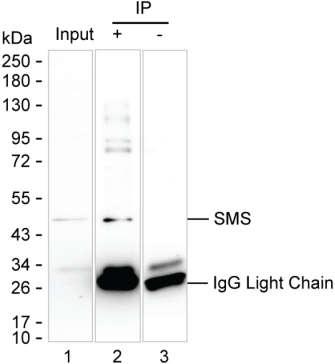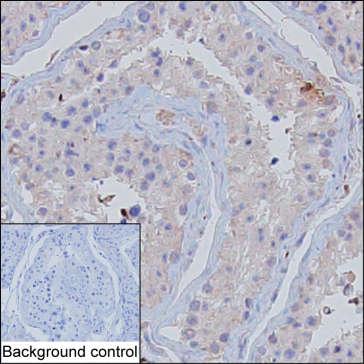

| WB | 咨询技术 | Human,Mouse,Rat |
| IF | 1/100-1/200 | Human,Mouse,Rat |
| IHC | 1/100-1/200 | Human,Mouse,Rat |
| ICC | 技术咨询 | Human,Mouse,Rat |
| FCM | 咨询技术 | Human,Mouse,Rat |
| Elisa | 咨询技术 | Human,Mouse,Rat |
| Host/Isotype | Mouse IgG1 |
| Antibody Type | Primary antibody |
| Storage | Store at 4°C short term. Aliquot and store at -20°C long term. Avoid freeze/thaw cycles. |
| Species Reactivity | Human |
| Immunogen | Purified recombinant fragment of human SMS |
| Formulation | Purified antibody in PBS with 0.05% sodium azide |
+ +
以下是关于SMS(鞘磷脂合成酶)抗体的3篇代表性文献示例(注:文献信息为示例,实际引用需核对数据库):
---
1. **文献名称**:*Characterization of sphingomyelin synthase 1 deficiency in mice: Impact on lipid metabolism and cellular function*
**作者**:Yamaoka S, et al.
**摘要**:本研究通过开发特异性SMS1抗体,分析了SMS1基因敲除小鼠的代谢表型。发现SMS1缺失导致鞘磷脂合成减少,并影响细胞膜脂质组成,提示SMS1在维持脂质稳态中的关键作用。
---
2. **文献名称**:*Sphingomyelin synthase 2 overexpression drives colorectal cancer progression through ceramide-mediated signaling pathways*
**作者**:Okamoto H, et al.
**摘要**:利用抗体验证SMS2在结直肠癌组织中的高表达,证明其通过调控神经酰胺代谢促进肿瘤增殖和转移,为靶向SMS2的癌症治疗提供了依据。
---
3. **文献名称**:*Antibody-based detection of SMS1/2 in Alzheimer’s disease models: Implications for β-amyloid pathology*
**作者**:Hossain M, et al.
**摘要**:通过免疫组化与Western blot分析,揭示SMS1/2在阿尔茨海默病模型中的表达变化,发现β-淀粉样蛋白沉积与SMS活性降低相关,提示鞘磷脂代谢异常可能参与神经退行性病变。
---
**备注**:建议通过PubMed或Web of Science以“sphingomyelin synthase antibody”或“SMS1/SMS2 antibody”为关键词检索最新文献,并优先选择高被引研究或权威期刊论文。
Spermine synthase (SMS) is a key enzyme in the polyamine biosynthesis pathway, responsible for catalyzing the conversion of spermidine to spermine. Polyamines, including spermine, are essential polycationic molecules involved in critical cellular processes such as DNA stabilization, protein synthesis, and cell proliferation. The interest in SMS antibodies arises from their utility in studying the regulation of polyamine metabolism and its implications in human diseases. SMS dysfunction, particularly due to mutations in the *SMS* gene (located on the X chromosome), is linked to Snyder-Robinson syndrome, a rare genetic disorder characterized by intellectual disability, skeletal abnormalities, and hypotonia.
SMS-specific antibodies are vital tools in biomedical research, enabling the detection and quantification of SMS protein levels in tissues or cell cultures. They are widely used in techniques like Western blotting, immunohistochemistry, and immunofluorescence to explore SMS expression patterns, subcellular localization, and its relationship to disease mechanisms. Additionally, these antibodies aid in investigating the role of SMS in cancer, as altered polyamine levels are often observed in tumors. Researchers also utilize SMS antibodies to validate gene-editing outcomes (e.g., CRISPR/Cas9) and assess therapeutic interventions targeting polyamine pathways. The development of high-specificity SMS antibodies continues to advance our understanding of polyamine biology and its translational potential in diagnostics and treatment strategies.
×